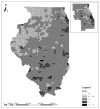Healthcare access, socioeconomic factors and late-stage cancer diagnosis: an exploratory spatial analysis and public policy implication
- PMID: 23316251
- PMCID: PMC3540777
- DOI: 10.1504/IJPP.2010.030606
Healthcare access, socioeconomic factors and late-stage cancer diagnosis: an exploratory spatial analysis and public policy implication
Abstract
Patients diagnosed with late-stage cancer have lower survival rates than those with early-stage cancer. This paper examines possible associations between several risk factors and late-stage diagnosis for four types of cancer in Illinois: breast cancer, prostate cancer, colorectal cancer, and lung cancer. Potential risk factors are composed of spatial factors and nonspatial factors. The spatial factors include accessibility to primary healthcare and distance or travel time to the nearest cancer screening facility. A set of demographic and socioeconomic variables are consolidated into three nonspatial factors by factor analysis. The Bayesian model with convolution priors is utilised to analyse the relationship between the above risk factors and each type of late-stage cancer while controlling for spatial autocorrelation. The results for breast cancer suggest that people living in neighbourhoods with socioeconomic disadvantages and cultural barriers are more likely to be diagnosed at a late stage. In regard to prostate cancer, people in regions with low socioeconomic status are also more likely to be diagnosed at a late stage. Diagnosis of late-stage colorectal or lung cancer is not significantly associated with any of the abovementioned risk factors. The results have important implications in public policy.
Figures
Similar articles
-
Late-Stage Breast Cancer Diagnosis and Health Care Access in Illinois.Prof Geogr. 2008 Feb;60(1):54-69. doi: 10.1080/00330120701724087. Prof Geogr. 2008. PMID: 18458760 Free PMC article.
-
Temporal changes of access to primary health care in Illinois (1990-2000) and policy implications.J Med Syst. 2004 Jun;28(3):287-99. doi: 10.1023/b:joms.0000032845.90730.84. J Med Syst. 2004. PMID: 15446618
-
Breast cancer stage at diagnosis: is travel time important?J Community Health. 2011 Dec;36(6):933-42. doi: 10.1007/s10900-011-9392-4. J Community Health. 2011. PMID: 21461957
-
Prostate cancer disparities in South Carolina: early detection, special programs, and descriptive epidemiology.J S C Med Assoc. 2006 Aug;102(7):241-9. J S C Med Assoc. 2006. PMID: 17319238 Review.
-
Influence of geographic access and socioeconomic characteristics on breast cancer outcomes: A systematic review.PLoS One. 2022 Jul 19;17(7):e0271319. doi: 10.1371/journal.pone.0271319. eCollection 2022. PLoS One. 2022. PMID: 35853035 Free PMC article.
Cited by
-
Racial, ethnic, and socioeconomic disparities in the presentation and management of pediatric thyroid cancer.Int J Pediatr Otorhinolaryngol. 2022 Nov;162:111331. doi: 10.1016/j.ijporl.2022.111331. Epub 2022 Oct 1. Int J Pediatr Otorhinolaryngol. 2022. PMID: 36206698 Free PMC article.
-
Estimating health service utilization potential using the supply-concentric demand-accumulation spatial availability index: a pulmonary rehabilitation case study.Int J Health Geogr. 2020 Aug 3;19(1):30. doi: 10.1186/s12942-020-00224-2. Int J Health Geogr. 2020. PMID: 32746848 Free PMC article.
-
The impact of rural health insurance on vulnerability to chronic poverty among rural residents in China: analysis using Probit and IVprobit models.Front Public Health. 2024 Oct 22;12:1481019. doi: 10.3389/fpubh.2024.1481019. eCollection 2024. Front Public Health. 2024. PMID: 39502828 Free PMC article.
-
Analyzing spatial aggregation error in statistical models of late-stage cancer risk: a Monte Carlo simulation approach.Int J Health Geogr. 2010 Oct 19;9:51. doi: 10.1186/1476-072X-9-51. Int J Health Geogr. 2010. PMID: 20959015 Free PMC article.
-
Exploring neighborhood inequality in female breast cancer incidence in Tehran using Bayesian spatial models and a spatial scan statistic.Epidemiol Health. 2017 May 17;39:e2017021. doi: 10.4178/epih.e2017021. eCollection 2017. Epidemiol Health. 2017. PMID: 28774168 Free PMC article.
References
-
- American Cancer Society. Cancer Facts & Figures 2007. National Home Office: American Cancer Society; Atlanta, Georgia: 2007. available at http://www.cancer.org/downloads/STT/CAFF2007PWSecured.pdf.
-
- Amey CH, Miller MK, Albrecht SL. The role of race and residence in determining stage at diagnosis of breast cancer. Journal of Rural Health. 1997;13:99–108. - PubMed
-
- Baquet CR, Commiskey P. Socioeconomic factors and breast carcinoma in multicultural women. American Cancer Society. 1999;88(5):1256–1264. - PubMed
-
- Barry J, Breen N. The importance of place of residence in predicting late-stage diagnosis of breast or cervical cancer. Health and Place. 2005;11:15–19. - PubMed
-
- Bennett CL, Ferreira MR, Davis TC, Kaplan J, Weinberger M, Kuzel T, Seday MA, Sartor O. Relation between literacy, race, and stage of presentation among low-income patients with prostate cancer. Journal of Clinical Oncology. 1998;16(9):3101–3104. - PubMed
Grants and funding
LinkOut - more resources
Full Text Sources

